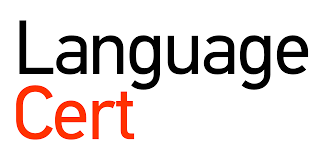Oral exams can be a stressful part of the certification process. With this in mind, we are here to answer some of the following questions: how do LanguageCert markers assess the B2-level candidates’ oral performance and what information can we share with our students when preparing for their Spoken Exam?
Marker assessment criteria
LanguageCert markers use 4 criteria to evaluate the candidates’ oral production:
- 1.Task Fulfilment and Coherence
- Accuracy and Range of Grammar
- Accuracy and Range of Vocabulary and lastly,
- Pronunciation-Intonation-Fluency.
Task Fulfilment and Coherence focuses on the candidates’ ability to manage assigned tasks adequately for their level and express themselves coherently.
Accuracy and Range of Grammar assesses their ability to demonstrate their range and control of grammar.
Accuracy and Range of Vocabulary evaluates their ability to demonstrate their range and control of vocabulary.
Lastly, Pronunciation, Intonation and Fluency relates to their ability to logically connect utterances, maintain the flow of conversation and engage in effective, communicative exchanges.
With the above in mind, what would the profile of a B2-level ‘high achiever’ look like?
A B2-level high achiever attaining the highest scores in all 4 criteria:
- would be very comprehensible and able to interact with ease and confidence in terms of ‘Task Fulfilment and Coherence’, personalise the topic of discussion effectively, include supporting details in his/her responses and highlight significant points. Also, his/her turn-taking would take place naturally, with clearly organised ideas and appropriate style.
- in terms of ‘Accuracy and Range of Grammar’, he/she would be expected to demonstrate that his/her speech contains a wide range of grammatical structures (expected at B2 level) and remains consistently accurate. Occasional minor errors might occur, but would largely be self-corrected.
- In terms of ‘Accuracy and Range of Vocabulary’, he/she would exhibit a wealth of vocabulary during his/her performance assessment, which would consistently be accurate and appropriate within the context.
- Lastly, in terms of ‘Pronunciation-Intonation-Fluency’, he/she would display clear pronunciation and intonation, which will add to the utterances’ intended meaning. His/her delivery rate would also be expected to be as natural as possible without breaking the flow too much.

Tips and strategies
LanguageCert International ESOL B2-level candidates therefore need to be ready to display quite a few skills on their Exam Day. As tips and language strategies can considerably help them in achieving this, here are some which you can share with your students.
‘Task Fulfilment and Coherence’
- Be aware of the format of the exam and of your assigned task.
- Try to present your ideas as logically as possible.
- Signpost your thoughts in order (e.g. by using ‘First of all’, ‘Then’, ‘Finally’).
- Use the appropriate style/language/tone, depending on the role assigned to you (e.g. in Part 2 which is a role play, or in Part 3 which is a discussion).
- Ask for clarification if you don’t really understand what you have to do or if you did not hear the question.
- Systematically avoid short or dry answers. Always expand on what you have to say. Provide a detailed response and support it with appropriate arguments .
- Make full use of all given prompts (e.g. in Part 3 which is a discussion) and say as much as you can about all of them.
‘Accuracy and Range of Grammar’
- Carry on even if you realise that you sometimes make a few grammatical mistakes while practising. Focus on not interrupting the flow of your oral responses. You’ll do better next time.
- Avoid complex sentence structures that may negatively affect the coherence and cohesion of your text.
- Tangibly show that you know more than just ‘basic’ grammar skills while, at the same time, maintaining cohesion and coherence in your composition.
- Before you answer any question, think of the appropriate grammar (e.g. if you are asked about your everyday activities, what tense(s) should you use?).
- Read as much as you can. This will help you improve your grammar much faster.
- Optionally, you can copy useful sentences that contain some grammar rule, practise them and memorise them for your Test Day.
‘Accuracy and Range of Vocabulary’
- Use as much of the ‘advanced’ vocabulary you know to reflect your current level. Show what you know, do not resort to the first few words that come to mind.
- Avoid generic words (good, bad, big etc.). Replace them with more descriptive/ specific/precise ones (e.g.: instead of ‘good’, use ‘interesting’, ‘amazing’, ‘outstanding’, ‘terrific’ etc.)
- Remember that the Interlocutor’s role (e.g. pretending to be a friend, a teacher etc.) will determine the appropriate style (e.g. in Part 2 which is a role play). You may have to use formal or informal language, depending on the instructions given.
- If you can’t remember a specific word, paraphrase it.
- Be aware of the topics to be expected and brush up on the relevant vocabulary beforehand.
- Avoid repetitions, use synonyms, paraphrase.
‘Pronunciation-Intonation-Fluency’
- Always try to speak clearly as this will affect your final mark. If necessary, practise with your teacher, classmates or friends.
- While practising, do not aim for perfection. If you are not happy with what you’re producing, carry on. Try to be as fluent as you can and next time, you’ll do better.
- Organise your thoughts before answering any questions (especially in Part 2 which is a role play and in Part 3 which is a discussion).
- In class, try to speak in English as much as possible. Try thinking in English, to get a more rounded perspective.
- Do not focus only on Grammar or on your coursebook. You can also learn a lot by listening to native speakers and develop your speaking skills that way. Take advantage of television, the Internet etc.
- Try to avoid stutters and pauses. Resort to ‘fillers’ for your silent gaps (e.g.: ‘Well’, ‘Now let me think’, ‘I mean’, ‘You know’).
- Practise speaking about a topic for up to 2 minutes through the year. Start with 1 minute, and work your way up from there.
- Learn to express what you have to say with reasons, evidence and personal experiences.
- Try to speak as spontaneously as possible and vary the tone of your voice.
- Don’t memorise answers or you won’t sound natural.
- Practise topics often recurring on the Spoken exam (e.g.: free time, education, shopping).
- Remember: listening is half the battle. Being fluent in a language often comes from listening to a lot of different sources from that language.
Keep in mind that you might have to pick and choose some of the above tips and strategies and tailor them to your students’ profiles (age, current level etc.) in order to keep them from being discouraged. Finally, remember that the above tips and strategies can very easily be introduced in your day-to-day teaching by means of language games, checklists, handouts, extra tasks added to your course book etc.
From all of us at LanguageCert, we wish your students the best of luck!



